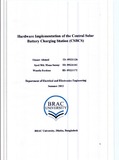Hardware implementation of the Central Solar Battery Charging Station (CSBCS)
Abstract
Bangladesh is witnessing an increase in solar electricity generation as part of an ambitious plan to boost the provision of power from renewable energy sources. Solar energy is being harnessed and converted to electrical energy via solar panels and then stored in batteries which can then be used to power households and agricultural activities. This project deals with the prototype design of the pilot project , CSBCS or the Central Solar Battery Charging Station with an aim to aid the process of solar electrification in rural areas and take the load off the grid in urban regions. The batteries charged by these stations can also be used to power modified rickshaws that are torque
sensor based and electrically assisted. Solar energy is the best form of renewable energy and this
prototype project has the motto "Go Green-Save the Planet-work for existence". Hardware
implementation of the CSBCS includes charging a 12 volt battery by using 75 watt solar panel
providing discrete amount of power at different time periods of the day. This paper gives a full
description of how a 12V solar charge controller is modified to be fed with any amount of
voltage to give a desired voltage output.
The Solar Batteries get charge from the PV cells through the charge controller. Whether charging
is complete , midway or beginning ; at the same time the condition of the batteries , whether fully
charged or not; all these information will be detected by the controller through the feedback and
the pwm(pulse width modulation), will be changed accordingly according to the battery needs
for efficient charging.

